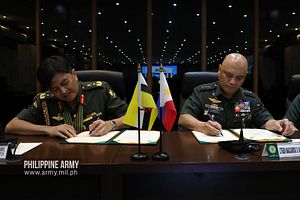Last week, Brunei and the Philippines inked terms of reference tied to an earlier memorandum of understanding on defense cooperation between them. Though the development was just one manifestation of the security relationship between the two Southeast Asian states, it nonetheless highlighted some of the ongoing activity within this dimension of ties.
As I have noted before in these pages, Brunei and the Philippines have a defense relationship as part of their broader bilateral ties, with defense ties formalized via a memorandum of understanding inked in 2001. Apart from usual components such as visits, exchanges, and exercises, Brunei also has a few uniformed personnel that have been deployed as part of the International Monitoring Team (IMT) headquartered in Cotabato city in Mindanao to help monitor the peace process ongoing in the southern Philippines since 2004.
Last week, the defense aspect of the relationship was in the headlines with the signing of the terms of reference to expand cooperation between the two armies. The head of the Philippine Army, Lt. Gen. Macairog S. Alberto, and the head of the Royal Brunei Land Forces, Brig. Gen. Dato Seri Pahlawan Awang Khairul Hamed Bin Awang Haji Lampoh, inked the TOR in Fort Bonifacio.
While both sides already have a MOU between them, the TOR will provide a guideline for how both the PA and the RBLF can expand the scope of the future activities between themselves, which is currently limited to areas such as exchanges. While specifics about the TOR itself were not disclosed, the Philippine Army noted on its Facebook account that some of the measures that the PA and RBLF had in mind would include working group meetings, training courses, bilateral trainings, exchange of visits, subject matter expert exchanges, and intelligence exchange.
Reflecting on the significance of this development, in the post, Khairul called the step “a historic visit and moment that will expand the relationship between our armies,” while Alberto noted that the RBLF was “among our priorities” when it came to expanding regionals security through cooperation with international counterparts.
To be sure, as with any developments of this ilk, the key will be in how both sides are actually able to follow through on implementing the steps they have agreed to in the wake of other priorities that they have as well as wider trends and events at play domestically and internationally. How exactly they do so will be important to which in the months and years to come, both for the relationship between the two armies as well as for the wider defense relationship.

































